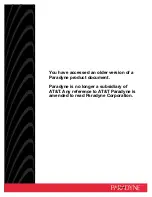
1.
Define a service level to determine the priority that will be applied to traffic.
2.
Apply a classifier to determine how the incoming traffic will be classified and thus treated by the Switch.
3.
Create a QoS profile which associates a service level and a classifier.
4.
Apply a QoS profile to a port(s).
4.8.2 QOS Configuration
QoS settings allow customization of packet priority in order to facilitate delivery of data traffic that might be affected
by latency problems. The IEEE 802.1p Priority specification uses 8 priority levels to classify data packets. In
802.1p compliant devices, a tag inserted into the packet header is used to identify the priority level of data packets.
The Switch supports four kinds of Traffic classifiers: 802.1P/ Port/MAC/VLANs and four queues.
NOTE:
COS:
Priority classifiers of the Switch forward packet. COS range is from 0 to 7. Seven is the
high class. Zero is the less class. The user may configure the mapping between COS and Traffic classifiers.
1. MAC-COS Mapping
QoS settings allow customization of MAC address to Traffic classifiers.
1. Fill the MAC Address field in the MAC-CoS Mapping Configuration Table in the In the format
“xx-xx-xx-xx-xx-xx “
.
2. Fill the mapping number in the
CoS (0-7)
field.
3. Click on the
“OK”
button to save.
4. To remove the MAC-CoS mapping item, simply click on the
“Delete”
button in the
Show MAC-CoS Mapping
table.
















































